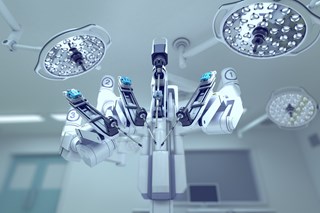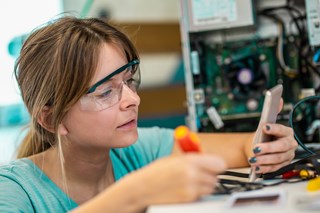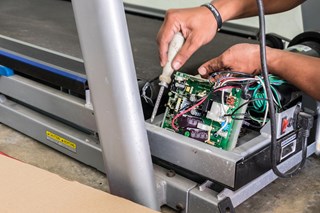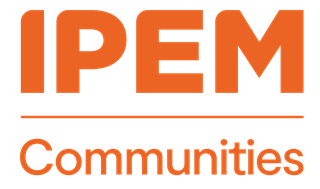We are IPEM
IPEM welcomes everyone with a professional interest in medical physics and clinical engineering.
Meet some of our individual members.
Anna Stec, IPEM Full member
A clinical engineer, specialising in medical device risk management and governance, a Senior Project Manager for Scan4Safety and a Benefits Realisation Manager in the National Digital Clinical Safety Programme.

Tell us about a typical work day, what is your role and what does it involve?
My typical day revolves around promoting the use and benefits of, and supporting the implementation of, digital technologies that improve patient safety, such as the Scan4Safety initiative. I also help ensure that the digital healthcare solutions we use in the NHS are clinically safe and meet the high standards expected in healthcare delivery, for example GDPR considerations. This involves cross-functional collaboration with NHS transformation and digital teams, arm's-length bodies of the DHSC, NHS providers, and regulatory bodies to oversee the development, deployment, and monitoring of digital health technologies.
One day, I might be visiting a hospital site somewhere in the country to see a medicine dispensing robot in action, or I might be meeting with clinical staff who are showing me how their smart blood fridges and transfusion tracking systems work. The next day, I may be presenting at a national conference for independent healthcare providers or attending meetings to investigate safety concerns related to a digital healthcare product. And some days, I will be developing communications and engagement plans with my team or adding content to our website.

What's the best thing about your job? which elements of your job do you like the most?
I love the variety and autonomy of my work. But I particularly enjoy the problem-solving aspect of my job and the opportunity to innovate within digital health, bringing safer, more efficient solutions to clinical settings.

What are the biggest challenges you see – either for yourself or the sector?
One of the main challenges is keeping pace with rapid technological advancements while ensuring compliance with clinical safety standards. The balance between innovation and regulation is delicate and critical. At the same time, we must be careful about digital discrimination and exclusion, keeping in mind that technology can create barriers to accessing health and care services for certain groups of the population.

If you could change one thing about the profession or your area of specialty, what would it be and why?
If I could change one thing about my profession, it would be to increase the visibility of healthcare scientists beyond the confines of their departments. I believe it is crucial for healthcare scientists to be more actively involved in innovation and improvement projects within their organizations and to hold leadership positions across the NHS. As a professional group, healthcare scientists have a vast amount to offer.
The Healthcare Science Fellowship at NHS England, along with other outstanding fellowship and development programs, has consistently demonstrated that clinical engineers, medical physicists, and other healthcare scientists not only contribute significantly but also deserve a seat at the decision-making table. These opportunities showcase our ability to lead and drive forward crucial innovations and improvements, influencing broader healthcare outcomes.

What accomplishment have you been most proud of in your career?
The accomplishment I am most proud of in my career is the opportunity I had as a healthcare science fellow to work on two projects that delivered testing and treatment services in the community. These projects were recognized by the wider profession as examples of creative and innovative practice, significantly advancing healthcare in those communities. And as an appreciation of their impact, we have been shortlisted for the National Advancing Healthcare Award twice, which definitely makes my mum very proud.

Why did you join IPEM and how do you engage with the Institute?
I joined IPEM to connect with a community of professionals dedicated to advancing medical physics and engineering, seeking both inspiration and opportunities to contribute to the field.
I volunteer as a member of interest groups (Environmental Sustainability, AI, and the Professional and Standards Council), and through conferences, workshops, and online forums. I participate in discussions on emerging technologies, digital clinical safety, and medical technology safety practices.

What skillsets do you think are required to be successful in your role, and is there a particular career path or training option you would recommend?
Critical thinking and a strong understanding of both healthcare operations and digital medical technology are definitely crucial. However, as healthcare services and patient pathways become more complex, we find ourselves working in increasingly complex environments. Thus, effective communication and leadership skills become even more important for a healthcare scientist. To build that skill set, I would highly recommend attending the PSEL programme from The Academy for Healthcare Science, as well as accessing coaching and mentoring sessions via the NHS Leadership Academy, which have helped me reach the next level in my own career.
IPEM’s Science Leadership Strategy is all about identifying and anticipating what might impact the working environment of our members now and in the near future. What are your predictions about the future of your profession and your area of specialty?
I foresee a greater emphasis on AI and machine learning to predict patient outcomes, personalize treatments, and enhance decision-making processes. Cybersecurity will also become increasingly vital as healthcare data becomes more digital.
What do you do in your free time?
I am passionate about promoting and advancing clinical engineering and healthcare sciences also in my free time. Over the years, I have contributed to developing education standards and exam papers for T-levels in Healthcare Sciences, and I've enjoyed lecturing to MSc Biomedical Engineering students at my old university in Poland. I actively participate in various IPEM interest groups and dedicate time to coaching and mentoring NHS colleagues.
However, traveling is what brings me the most joy. I love discovering the beauty of the world and learning about the cultures and histories of different countries. So far, I have visited 36 countries. Some of my travels have been directly connected to my professional growth—I spent one year in Greece on a student exchange programme, I attended a clinical engineering conference and visited hospitals in China, went to Malaysia for one of my scientist training program rotations, and explored medical technology innovations at a trade show in Germany. These experiences not only enriched my personal life but also expanded my professional horizons, and I always encourage my colleagues to seize similar opportunities.
Which IPEM member benefits do you value or use the most?
Being a member of IPEM is helpful, especially since I no longer work directly in a hospital setting and don't practice healthcare science in the conventional sense. In my current role, opportunities to collaborate directly with other clinical engineers or scientists are rare. Membership in IPEM helps bridge this gap by keeping me connected with the latest trends and developments within my professional field. The access it provides to cutting-edge research, networking opportunities, and continuing professional development resources are the benefits I find most valuable. These tools not only keep me informed but also ensure that I remain at the forefront of my field, continually enhancing my expertise and professional network.
What does (or should) IPEM do to help you in your career?
I believe IPEM should continue to advocate for the profession, provide guidance on navigating the evolving healthcare landscape, and offer resources for continuous learning and professional growth.